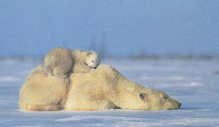|
Reading
& Discussion
Exams
Research
Projects
Writing and Presentation
Field Trips
Grading
Back
to Top
Back
to Top
Back
to Top
Back
to Top
Back
to Top
|
Readings,
Discussion, and Participation
• Reading:
The required text for this course is Environmental
Science, A Global Concern, by William Cunningham and Barbara W.
Saigo. 2000. McGraw Hill, Madison, WI.
This book features
a great Environmental
Science Online student learning center. This site features
interactive lecture notes on each chapter and much, much more.
Readings must be completed
by the day indicated on the weekly schedule. DO NOT GET BEHIND!
While reading, your job will be to write down 2 questions you
have on concepts you don't understand. In addition, there will
be several discussion questions assigned to you at the end of
every lecture.
• In-Class Participation:
In this course, we will combine daily lectures with discussions.
Please come PREPARED to share your ideas! PARTICIPATION includes
more than simply attending class. Participation means contributing
your ideas, actively listening to others, and criticically analyzing
the material with your peers.
• Leading Discussion: Several
times throughout the course, you and a partner will lead a discussion
on an article that will be assigned to you. Your job will be to
present the main themes of the article, and raise questions, misconceptions,
and insights.
• Evening Informal Discussion Sections:
Your homework will be to get together in groups each night to
answer assigned discussion questions for the following morning.
This homework will not be graded, but it will greatly assist you
with your understanding of the material. We will reserve 1 hour
each day of class to discuss each of your questions and answers.
Exams
You will be tested on lecture and field trip material at the end
of week 2 (Thursday Feb 8) and week 4 (Wednesday March 13). The
exams will be in class, closed book, essay and short problem
format. No make up exams will be
given except in cases of medical or family emergency (Dean's office
will verify). Exam questions will be similar to those
assigned for evening discussions. I will conduct a short review
session the evening before the final exam. Please consult the
EV 121 Daily Schedule for details.
Research
Project
Over the course of the block, you and a partner will be conducting
an environmental research project of your choosing using the concepts
and skills you learn in class. By Thursday of week 1, you should
have already spoken to me in detail about your project proposals
and will have turned in a Research Proposal outlining in detail
your question, methods, sampling plan, expected results, and why
this question is important. For details, go to this link: EV121
Project Details
• Research Project Presentation
and Web Page. At the beginning of week 4, you
will orally present your work from your published web document.
Your presentation must be linked to your web page because we will
access it from the web in class that day.
•
Two consultation days. At the end of week
one and week two, you will have a full Friday to conduct your
research project. These days are NOT to
be seen as "days off." All members of each group
are required to work together on projects this day. Anyone who
does not participate in the project on these days will automatically
take a grade deduction in their project.
•
Group Work. The research projects will require
full participation of each member of the group. If
you are taking the class pass/fail, you will pass the class ONLY
if you contribute and equal amount of time and effort as other
members of your group. This policy will ensure that the
student who is taking the course for a grade will not have to
"carry" the entire project on her/his own. Participation
of each group member will be assessed by each of you anonymously
at the end of the block.
Writing and
Oral Presentation
• Clear and concise writing and oral presentation are essential
tools to be an effective scientist or spokesperson for the environment.
I strongly recomment that you use the CC
Writing Center tutors and/or have your friends read your work
for grammar, clarity, and style before you turn it in to me. I
will pay close attention to your writing throughout the course
and will grade accordingly. For tips on how to give a good presentation,
click here
Field
Trips
• When and where: We
will be taking one day-trip each during weeks one and two to explore
environmental and ecological issues in our beautiful, Rocky Mountain
and Southwestern region. All field trips are mandatory. Consult
the Daily Schedule to see when and where field trips will take
place. All field trips will begin at 9:00 am sharp in the back
of Barnes, at the loading dock, unless otherwise specified.
• Day trip gear: All
students must supply their own gear for day hikes, including appropriate
clothing for warm and cold weather (maybe rain or snow!), water
bottle, sunscreen, good walking shoes, packed lunch, notebook
and pencil.
Grading
To get an "A"
in this course, you must demonstrate mastery of Enviromental Science
topics, superior oral communication, and excellent initiative
and research skills in your final project.
| Exam
1 (Week 2) |
25% |
| Exam
2 (Week 4) |
30% |
| Research
Presentation |
20% |
| Project
Web Site |
20% |
| Participation |
5% |
Grades will be assigned as follows:
90-100 A, 80-89 B, 70-79 C, 60-69 D, 0-59 forget it.
|
